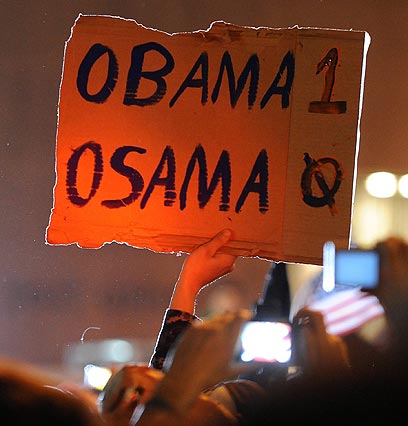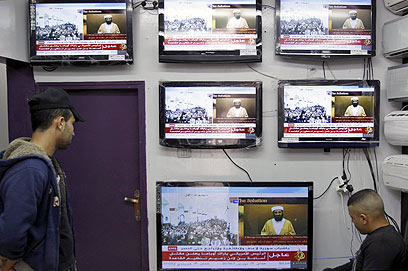Symbol dies, Jihad lives on
Commentary: Ron Ben-Yishai says murderous, fanatic Islam still there, with or without Bin Laden
The Bin Laden manhunt got underway even before September 11, 2001. In 1998, al-Qaeda members carried out the terror attacks in Kenya and Tanzania on his orders, while Bill Clinton was president. Clinton narrowly missed Bin Laden after US troops fired cruise missiles at his Afghanistan training camp.
The second missed opportunity came after the September 11 attacks. Bin Laden was hiding in northeastern Afghanistan, in the Torra Borra caves. US Special Forces attempted to nab him there, yet after a two-month pursuit he managed to flee to Pakistan, while borrowing $7,000 from his aides in order to survive.
For years after that, US intelligence agencies had leads that almost led them to Bin Laden. One of his deputies, Ali Sheikh Muhammad, was nabbed in Pakistan, and his Palestinian partner Abdullah Azzam was also captured. However, Bin Laden was able to evade capture thanks to a network of trusted aides.
Similarities to Shalit case
The operation to settle the score with Bin Laden didn’t go as planned. The US was hoping for a quiet arrest, as was the case with Saddam Hussein, yet the Special Forces were spotted and attacked. The fact that the Americans were unable to nab Bin Laden alive and create a demoralizing deterrent effect constitutes a certain disappointment.
Given the immense resources dedicates to the manhunt, the fact that Bin Laden was located after more than a decade cannot be characterized as a huge achievement. However, we must recall the difficulties inherent in locating him, which are very similar to the difficulties in locating abducted IDF soldier Gilad Shalit.
Bin Laden was hiding in a hostile, radical Muslim state where the regime and mostly intelligence officials did not hide their sympathy for his ideology and for the organizations inspired by him. Moreover, he was hidden by a small family, loyal to al-Qaeda, which also received huge amounts of money. This sounds very much like the Gaza Strip.
Apparently, what ultimately allowed the US to get to Bin Laden were his weak ties with his family, even though they were maintained via emissaries and encoded satellite phones.

Festivities in US after bin Laden's death (Photo: EPA)
The next attack?
So what will happen next? There is no doubt that America’s regional image, which suffered harsh blows recently, will be reinforced, and this is important these days with the US aiming to use its influence to woo the regimes that will be leading the Mideast in the coming generations.
President Obama, who showed typical political eagerness in taking credit for the achievement, will score some points in US and global public opinion, yet it’s doubtful whether it will help him in his reelection bid a year and a half from now. Until that time, the achievement will be forgotten, and the economy will be the deciding factor.
As to al-Qaeda revenge attacks: The Americans are already adopting precautionary measures. While a major revenge attack requires a serious planning and intelligence gathering effort, there are enough radical Muslims in the Western world who may be prompted to carry out a “sporadic” assault, such as a shooting attack for example, in order to express their fury and sorrow.
In the long-run way may see more complex attacks by radical Muslims aiming to perpetrate mass murder. We must also keep in mind that al-Qaeda is not a hierarchical organization that is gravely disrupted by the killing of its commander. Bin Laden was more of a guide and source of inspiration to dozens of Global Jihad groups – militant Islam groups that were inspired by him, that sometimes operated on his orders, and that rarely were directly financed by him.

Palestinians watch coverage in Jenin (Photo: AP)
The Israeli angle
Hence, Bin Laden’s assassination is more like the killing of a spiritual leader rather than a terror commander. The 2004 killing of Sheikh Ahmed Yassin in Gaza had a similar effect and was a great blow to Hamas.
However, the groups officially affiliated with al-Qaeda are powerful and include dozens of activists, spiritual leaders, and experienced operational commanders boasting great prestige. They will continue to operate exactly as they did during Bin Laden’s era. We must also keep in mind that at this time of Arab world uprisings, the ability of Arab regimes to contend with these groups is declining.
Yemen’s president, for example, was one of the leaders who agreed to cooperate with the US in its war on one of al-Qaeda’s most dangerous groups. However, with his regime in question, terrorists in the area are free to do almost anything they want. The same is true in Libya and Tunisia. Meanwhile, Egypt largely lost its control over the Sinai Peninsula and in more remote areas, and this allows radical Islamic groups to carry out attacks. Bashar Assad’s unstable regime is also making it easier for radical Islamic groups to get organized and act.
The above developments require Israel to make sure that its borders are sealed off and mostly to continue its efforts to identify Global Jihad groups that may target us. Of course, we must be careful when traveling abroad, especially in the Mediterranean region.
Bin Laden’s assassination is no doubt a grave demoralizing blow to Global Jihad, yet fanatical, murderous Islam is still there, with or without Bin Laden. We can assume that he will be succeeded by his deputy, Ayman al-Zawahiri, who will apparently continue to issue audiotapes with ideological principles and instructions to followers via al-Jazeera.
- Follow Ynetnews on Facebook










